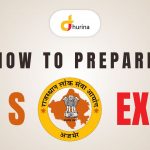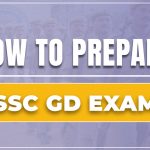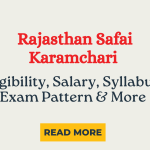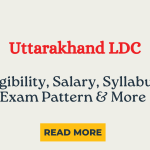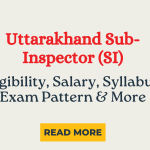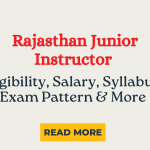Rajasthan Public Service Commission conducts the Rajasthan Administrative Service (RAS) Exam to recruit candidates for various prestigious government posts across the state. Aspirants work hard to qualify the RAS exam. And to prepare for such a competitive exam, one should be aware of the syllabus and exam pattern. And along with this, the previous year’s paper is also a critical part of preparation. This article will discuss the complete RAS syllabus of Prelims, Mains, and Interviews.
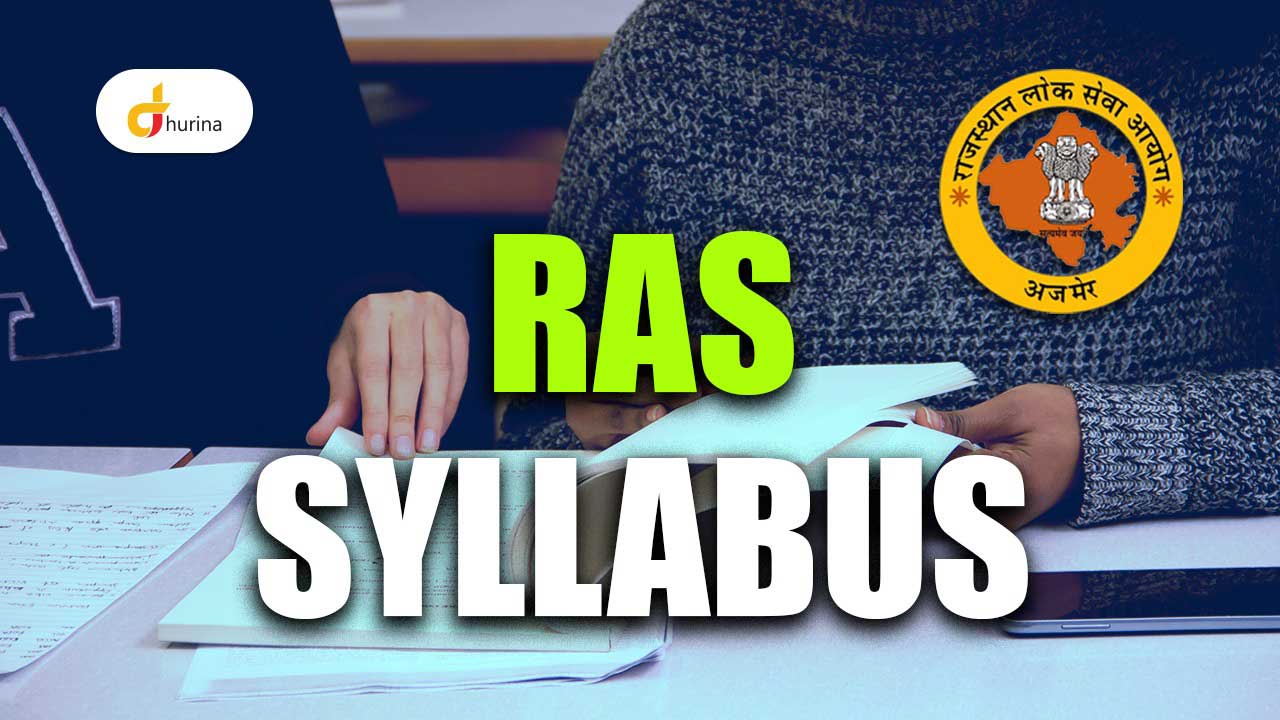
The Examination is conducted in three stages: Preliminary, Mains, and Interview. In this article, first, we will discuss the prelims syllabus; second, the mains; and finally, the interview.
Prelims is an MCQ-type paper with a total of 200 marks. Mains consists of 4 subjective-type papers containing 200 marks each. The interview round, also considered one of the most challenging stages, consists of 100 marks.
RAS Prelims Exam Pattern
The RPSC RAS Prelims Exam is a three-hour objective-type paper with 200 marks. The difficulty level is of graduation level.
| Subject | No. of Questions | Marks | Duration |
|---|---|---|---|
| General Knowledge & General Science | 150 | 200 | 3 Hours |
There will only be one paper in the RPSC RAS Prelims Exam: General Knowledge. This is a competitive type of exam. Therefore, candidates must score marks to meet the cutoff in the Prelims exam to qualify for the Mains exam.
RAS Mains Exam Pattern
Aspirants who qualify in the prelims exam are called for the RAS mains written exam. There are four papers in the RAS Mains exam. Each paper of 200 marks with a time limit of 3 hours. It will be a descriptive examination.
| RAS Mains Exam Paper | Total Marks | Total Time |
|---|---|---|
| Paper-1: General Studies-I | 200 marks | 3 hours |
| Paper-2: General Studies-II | 200 marks | 3 hours |
| Paper-3: General Studies-III | 200 marks | 3 hours |
| Paper-4: General Hindi and General English | 200 marks | 3 hours |
| Total | 800 marks |
Candidates who qualify the main written exam are eligible for the interview stage. The interview stage/personality test contains 100 marks.
After all these three stages, RPSC will release the final list of selected candidates.
Now let’s discuss the syllabus of Prelims, mains, and the interview stage.
RAS Prelims Syllabus
Aspirants must go through the syllabus to understand what is essential for the exam. Everyone must agree that the syllabus is the only key to getting the desired exam scores. Look at the RAS Syllabus of Prelims exams. It would help if you kept the RPSC RAS syllabus during preparation.
You can also download its PDF through the link provided. Take its printout and keep it on the desk while preparing for the exam.
General Knowledge and General Science
History, Art, Culture, Literature, Tradition & Heritage of Rajasthan
- Major Landmarks in the History of Rajasthan,
- Freedom Movement, Political Awakening, and Integration
- Salient features of Architecture – Forts and Monuments Arts, Paintings, and Handicrafts.
- Important Works of Rajasthani literature.
- Local Dialects Fairs, Festivals, Folk Music, and Folk Dances.
- Rajasthani Culture, Traditions, and Heritage.
- Religious Movements, Saints & Lok Devtas of Rajasthan.
- Important Tourist Places.
- Leading Personalities of Rajasthan
Indian History
- Ancient & Medieval Period: Salient features and Major Landmarks of Ancient and Medieval India Art, Culture, Literature, and Architecture, Major Dynasties, Their Administrative System. Socio-Economic Conditions, Prominent Movements.
- Modern Period: Modern Indian history (from about the middle of the eighteenth century until the present)- significant events, personalities, and issues, The Freedom Struggle & Indian National Movement- its various stages and important contributors and contributions from different parts of the country, Social and Religious Reform movements in the 19th and 20th centuries, Post-independence consolidation and reorganization within the country
Geography of the World and India
- World Geography: Broad Physical features., Environmental and Ecological Issues, Wildlife and Biodiversity, International Waterways, Major Industrial Regions.
- Geography of India: Broad physical features and Major physiographic divisions, Agriculture and Agro-based Activities, Minerals – Iron, Manganese, Coal, Oil & Gas, Atomic minerals, Major Industries and Industrial development, Transportation– major transport corridors, Natural Resources, Environmental Problems and Ecological Issues
Geography of Rajasthan
- Broad physical features and Major physiographic divisions.
- Natural Resource of Rajasthan- Climate, Natural Vegetation, Forests, Wildlife, and Biodiversity Major irrigation projects.
- Mines and Minerals.
- Population.
- Major Industries and Potential for Industrial Development
Indian Constitution, Political System, and Governance
- Constitutional Development & Indian Constitution: Government of India Acts: 1919 and 1935, Constituent Assembly, Nature of Indian Constitution; Preamble, Fundamental Rights, Directive Principles of State, Fundamental Duties, Federal Structure, Constitutional Amendments, Emergency Provisions, Public Interest Litigation (PIL) and Judicial Review.
- Indian Political System and Governance: Nature of Indian State, Democracy in India, Reorganization of States, Coalition Governments, Political Parties, National Integration, Union and State Executive; Union and State Legislative, Judiciary, President, Parliament, Supreme Court, Election Commission, Comptroller and Auditor General, Planning Commission, National Development Council, Central Vigilance Commission (CVC), Central Information Commission, Lokpal, National Human Rights Commission (NHRC), Local Self Government & Panchayati Raj
- Public Policy & Rights: National Public Policy as a welfare state, Various Legal Rights and Citizen Charter
Political and Administrative System of Rajasthan
- Governor, Chief Minister, State Assembly, High Court, Rajasthan Public Service Commission, District Administration, State Human Rights Commission, Lokayukta, State Election Commission, State Information Commission.
- Public Policy, Legal Rights, and Citizen Charter.
Economic Concepts and Indian Economy
- Basic Concepts of Economics: Basic Knowledge of Budgeting, Banking, Public Finance, National Income, Growth and Development, Accounting- Concept, Tools, and Uses in Administration, Stock Exchange and Share Market, Fiscal and Monetary Policies, Subsidies, Public Distribution System, e-Commerce, Inflation- Concept, Impact and Control Mechanism
- Economic Development & Planning: 5 Year Plans – Objectives, Strategies, and Achievements, Major Sectors of Economy- Agriculture, Industry, Service, and Trade- Current Status, Issues & Initiatives, Major Economic Problems and Government Initiatives. Economic Reforms and Liberalization
- Human Resource and Economic Development: Human Development Index Poverty and Unemployment:- Concept, Types, Causes, Remedies, and Current Flagship Schemes.
- Social Justice and Empowerment: Provisions for Weaker Sections.
The economy of Rajasthan
- A macro overview of the Economy.
- Major Agricultural, Industrial, and Service Sector Issues. Growth, Development, and Planning.
- Infrastructure & Resources.
- Major Development Projects.
- Programs and Schemes- Government Welfare Schemes for SC/ST/Backward Class/Minorities/Disabled Persons, Destitute, Women, Children, Old Age People, Farmers & Labourers.
Science & Technology Basics of Everyday Science
- Electronics, Computers, Information, and Communication Technology.
- Space Technology, including Satellites. Defense Technology. Nanotechnology.
- The human body, Food, and Nutrition, Health care.
- Environmental and Ecological Changes and their Impacts.
- Biodiversity, Biotechnology, and Genetic Engineering.
- Agriculture, Horticulture, Forestry, and Animal Husbandry with special reference to Rajasthan.
- Development of Science and Technology in Rajasthan.
Reasoning & Mental Ability
- Logical Reasoning (Deductive, Inductive, Abductive): Statement and Assumptions, Statement and Argument, Statements and Conclusion, Courses of Action, Analytical Reasoning.
- Mental Ability: Number series, Letter series, Odd man out, Coding-Decoding, Problems relating to Relations, Shapes, and their sub-sections.
- Basic Numeracy: Elementary knowledge of Mathematical and Statistical Analysis, Number System, Order of Magnitude, Ratio, and Proportion, Percentage, Simple and Compound Interest, Data Analysis (Tables, Bar diagram, Line graph, Pie-chart).
Current Affairs
- Major Current Events and Issues of State(Rajasthan)
- National and International Importance
- Persons and Places in recent news
- Games and Sports related Activities
RAS Mains Syllabus
RPSC candidates who clear the preliminary exams will be able to sit for the mains examination. The Mains exam determines whether a candidate is selected, as the final selection is determined by the marks obtained at the Mains and the interview. As you prepare for the exams, you should keep the RPSC RAS syllabus complete.
Paper – I
General Knowledge and General Studies
Unit I- HISTORY
Part A – History, Art, Culture, Literature, Tradition, and Heritage of
Rajasthan
- Major landmarks in the History of Rajasthan from Pre-historic times to the close of the 18th Century, Important dynasties, and their administrative and revenue system.
- Salient events of 19th & 20th centuries: Peasant & Tribal Movements. Political Awakening, Freedom Movement and Integration.
- Heritage of Rajasthan: Performing & fine Art, Handicraft and Architecture; Fairs, Festivals, Folk Music and Folk Dance.
- Important works of Rajasthani Literature and Dialects of Rajasthan.
- Saints, Lok Devtas and eminent personalities of Rajasthan.
Part B (Indian, History & Culture)
- Indian heritage: Fine Art, Performing Art, Architecture & Literature from Indus Civilization to British Era.
- Religious Movements and religious philosophy in Ancient and Medieval India.
- History of Modern India from the beginning of the 19th Century to 1965 AD: Significant events, personalities, and issues.
- Indian National Movement- Its various stages & streams, important contributors and contributions from different parts of the country.
- Socio-religious Reform Movements in the 19th and 20th Century.
- Post-Independence consolidation and reorganization.
Part C – History of the Modern World (up to 1950AD)
- Renaissance and Reformation.
- Enlightenment and Industrial Revolution.
- Imperialism and colonialism in Asia and Africa.
- Impact of World Wars
Unit II- ECONOMICS
Part A (Indian Economy Major Sectors of Economy)
- Primary Sectors of Economy: Industrial, Agriculture, Service.
- Banking Sector: Concept of Money supply & High-Powered Money. Role and Functions of Central Bank & Commercial Banks, issues of NPA, Financial Inclusion. Monetary Policy- Concept, objectives & Instruments.
- Public Finance: Tax reforms in India- Direct & Indirect, subsidies- Cash Transfer and other related issues. Recent Fiscal Policy of India.
- Recent Trends in Indian Economy: Role of Foreign Capital, MNCs, PDS, FDI, Exim Policy, 12th Finance Commission, Poverty alleviation schemes.
Part B (World Economy)
- Global Economic Issues and trends: Role of World Bank, IMF & WTO.
- Concept of Developing, Emerging and Developed countries.
- India in Global Scenario
Part C- Economy of Rajasthan
- Agriculture, Horticulture, Forestry, Dairy and Animal husbandry with special reference to Rajasthan.
- Industrial Sector- Growth and recent trends.
- Growth, Development & Planning with special reference to Rajasthan.
- Recent development and issues in the service sector of Rajasthan.
- Major Development Projects of Rajasthan- their objectives and impact.
- Public-Private Partnership Model for Economic Transformation in Rajasthan.
- Demographic Scenario of the State and its impact on the Rajasthan Economy.
Unit III- SOCIOLOGY, MANAGEMENT & BUSINESS ADMINISTRATION
Part A- Sociology
- Social Values
- Caste Class & Occupation
- Sanskritization
- Varna, Ashram, Purusharth and Sanskar Vyavastha
- Secularism
- Issues and Problems of Society
- Tribal community of Rajasthan: Bhil, Mina (Meena), and Garasia.
Part B- Management
- Management – Scope, concept, functions of Management – Planning, Organizing, Staffing, Direction, Coordination and Control, Decision-Making: concept, process and techniques.
- The modern concept of Marketing, Marketing Mix – Product, Price, Place and Promotion
- Objective, the concept of maximization of wealth, Sources of Finance – Short and Long term, Capital Structure, Cost of Capital
- Concept and Main theories of Leadership and Motivation, Communication, Basics of recruitment, selection, induction, training & development and appraisal system.
Part C- Business Administration
- Techniques of analysis of financial statements, Basics of Working Capital Management, Responsibility and Social Accounting
- Meaning & Objectives of Auditing, Internal Control, Social, Performance and Efficiency Audit.
- Basics of different types of Budgeting, Budgetary control.
Paper –II
General Knowledge and General Studies
Unit I- Logical Reasoning, Mental Ability and Basic Numeracy
- Number Series, Letter Series, Coding-Decoding
- Problems related to Relations
- Shapes and their Sub-sections, Venn Diagram
- Problems based on Clocks, Age and Calendar
- Number system and order of Magnitude
- Simultaneous Linear Equations in Two Variables
- Ratio and Proportion, Compound Proportion
- Square Root, Cube Root, HCF and LCM.
- Percentage, Simple and Compound Interest
- Time and Work, Speed and Distance
- Area and Perimeter of Simple Geometrical Shapes, Volume and Surface Area of Sphere, Cone, Cylinder and Cuboids
- Trigonometry Ratios and Angles
- Data Analysis (Tables, Bar-Graph, Line Graph, Pie-Chart)
- Measures of Central Tendency, Mean, Mode, Median, Standard Deviation and Variance
- Probability
Unit II- General Science & Technology
- Motion, laws of motion, work energy and power, rotational motion, gravitation, simple harmonic motion, waves
- Properties of matter, electrostatics, current electricity, moving charge and magnetism.
- Ray optics, Photoelectric effect, Nuclear physics, semiconductor devices
- Electromagnetic waves, communication systems, basics of computers, use of information technology in administration, e-governance and e-commerce, contributions of Indian scientists in the development of science
- States of matter, Atomic structure, chemical bonding and molecular structure, equilibriums
- Thermodynamics, kinetic theory of gases, solid-state, solutions, electrochemistry, Chemical kinetics
- A characteristic feature of life
- Nutrition in organisms
- Principal of inheritance and variation
- Human health and diseases
- Biotechnology and its applications
- Biodiversity and Conservation
- Ecosystems
- Agriculture, Horticulture, Forestry, Dairy and Animal Husbandry with special reference to Rajasthan.
Unit III- Earth Science (Geography & Geology)
Part A- World
- Broad Physical Feature: Mountains, Plateaus, Plains, Lakes and Glaciers.
- Earthquakes and Volcanoes: Types, distribution and their impact
- Earth and its Geological time scale.
- Current Geopolitical Problems.
Part B- India
- India Broad Physical Features: Mountains, Plateaus, Plains, Lakes and Glaciers.
- Major Physiographic divisions of India.
- Climate – Origin of Monsoon, Seasonal Climatic conditions, Distribution of rainfall and climatic regions,
- Natural Resources: (a) Water, Forest, Soil (b) Rocks & Mineral: Types and their uses
- Population: Growth, Distribution and Density, Sex-ratio, Literacy, urban and Rural Population.
Part C- Rajasthan
- Rajasthan Broad Physical Features: Mountains, Plateaus, Plains, Rivers and Lakes.
- Major Physiographic Regions.
- Natural Vegetation and Climate.
- Livestock, Wildlife and its Conversation.
- Agriculture – Major Crops. Mineral Resources: (i) Metallic Minerals- Types, distribution and Industrial uses and their conservation. (ii)Non-Metallic Minerals- Types, distribution and Industrial uses and their conservation.
- Energy Resources: Conventional and Non-conventional Population and Tribes.
Paper-III
General Knowledge and General Studies
Unit I- Indian Political System, World Politics and Current Affairs
- Indian Constitution: Framing, Features, Amendments, Basic Structure.
- Ideological Contents: Preamble, Fundamental Rights, Directive Principles of
- State Policy, Fundamental Duties.
- Institutional framework- I: Parliamentary System, President, Prime Minister
- and Council of Ministers, Parliament.
- Institutional Framework- II: Federalism, Centre-State relations, Supreme
- Court, High Courts, Judicial Review, Judicial Activism.
- Institutional Framework- III: Election Commission of India, Comptroller and
- Auditor General, Union Public Service Commission, NITI Aayog, Central
- Vigilance Commission, Central Information Commission, National Human
- Rights Commission
- Political Dynamics: Role of Cast, Religion, Class, Ethnicity, Language and
- Gender in Indian Politics, Political Parties and Electoral Behavior, Civil
- Society and Political Movement, Issues related to National Integrity and
- Security. Potential areas of Socio-Political conflicts
- State Politics of Rajasthan: Party System, Political Demography, Different
- phases of Political competition in Rajasthan, Panchayati Raj and Urban self
- Government Institutions
- Emerging World Order in the post-Cold War era, USA’s hegemony and its
- resistance, UN and Regional Organizations, International Terrorism and
- Environmental issues.
- Foreign Policy of India: Evolution, Determinants, India’s relations with USA,
- China, Russia and European Union, India’s role in UN, NAM, BRICS, G- 20,
- G- 77 and SAARC.
- Geo-political and Strategic development in South Asia, South East Asia and
- West Asia and their impact on India.
- Current Affairs: Current events, persons and places of Rajasthan, National and
- International importance, recent activities related to games and sports.
Unit II- Concepts, Issues and Dynamics of Public Administration and Management
- Administration and management: Meaning, nature and significance. Its role in developed & developing societies. Evolution of Public Administration as a discipline, new public administration, Theories of public administration.
- Concepts of power, authority, legitimacy, responsibility and delegation.
- Principles of organization: Hierarchy, Span of control and unity of command
- Functions of management, corporate governance and social responsibility
- New dimensions of public management, management of change.
- Attitude and foundational values of civil services: integrity, impartiality, and non-partisanship, dedication to public service, the relationship between generalists and specialists.
- Legislative & Judicial control over administration: various methods and techniques of legislative & judicial control.
- Administrative setup, administrative culture in Rajasthan: Governor, Chief Minister, Council of Ministers, State Secretariat and Chief Secretary.
- District administration: organization, the role of District Collector and Superintendent of Police, Sub-divisional and Tehsil administration.
- Development Administration: Meaning, Scope and Characteristics.
- State Human Rights Commission, State Election Commission, Lokayukta, Rajasthan Public Service Commission, Public Service Guarantee Act, 2011
Unit III- Administrative Ethics, Behavior and Law
Part A- Administrative Ethics
- Administrative Ethics: Ethics and human interface: Essence, Determinants, and Consequences of ethic and human actions-Moral values (rights and Duties; Good and Virtues), Cardinal virtues of Plato, Utilitarianism- J.S. Mill, Freedom of will and moral responsibility
- Kantian ethics, Ethics of Bhagavad Gita and its role in the administration.
- Dimension of ethics: Role of administrators in society and educational institutions in the inculcating
- Ethics in private and public relationships- Behaviour, Moral and Political attitudes of administrators.
Part B – Behavior
- Intelligence: Cognitive intelligence, social intelligence, Emotional intelligence, Cultural intelligence and Howard Gardner’s multiple intelligence theory.
- Personality: Psychoanalytical theories, Trait and Type theories, Determinants of personality and Assessment of personality.
- Learning and Motivation: Learning styles, Models of memory, causes of forgetting. Classification and types of motives, Theories of work motivation, Assessment of motivation
- Meeting Life Challenges: Stress: Nature, type, Sources, Symptoms, Effects, Stress Management, Promotion of Positive health and well-being.
Part C- Law
- Concepts of Law: Ownership and possession, Personality, Liability, Rights and Duties.
- Contemporary Legal issues: Right to information, Information technology law including cyber laws (concepts, purpose, prospects), Intellectual Property Rights (concepts, types, purpose, prospects)
- Crimes against Women and Children: Domestic Violence, Sexual Harassment in the workplace, the protection of children from sexual offences Act 2012, Laws related to child labour.
- Important Land Laws in Rajasthan: Rajasthan Land Revenue Act, 1956; Rajasthan Tenancy Act, 1955
Paper – IV
General English and General Hindi
General English (Part A- Grammar)
- Correction of Sentences:
- Sentences for correction with errors related to Articles & Determiners Prepositions
- Tenses & Sequence of Tenses
- Modals Voice- Active & Passive
- Narration- Direct & Indirect
- Synonyms & Antonyms
- Phrasal Verbs & Idioms
- One Word Substitute
- Words are often Confused or Misused
Part B- Comprehension, Translation & Precis Writing
- Comprehension of an Unseen Passage (approximately 250 words) 05 Questions based on the passage.
- Translation of five sentences from Hindi to English.
- Precis Writing (a short passage of approximately 150-200 words)
Part C- Composition & Letter Writing (30 Marks)
- Paragraph Writing- Any 01 paragraph out of three given topics (approximately 200 words)
- Elaboration of a given theme (Any 1 out of 3, approximately 150 words)
- Letter Writing or Report Writing (approximately 150 words)
General Hindi
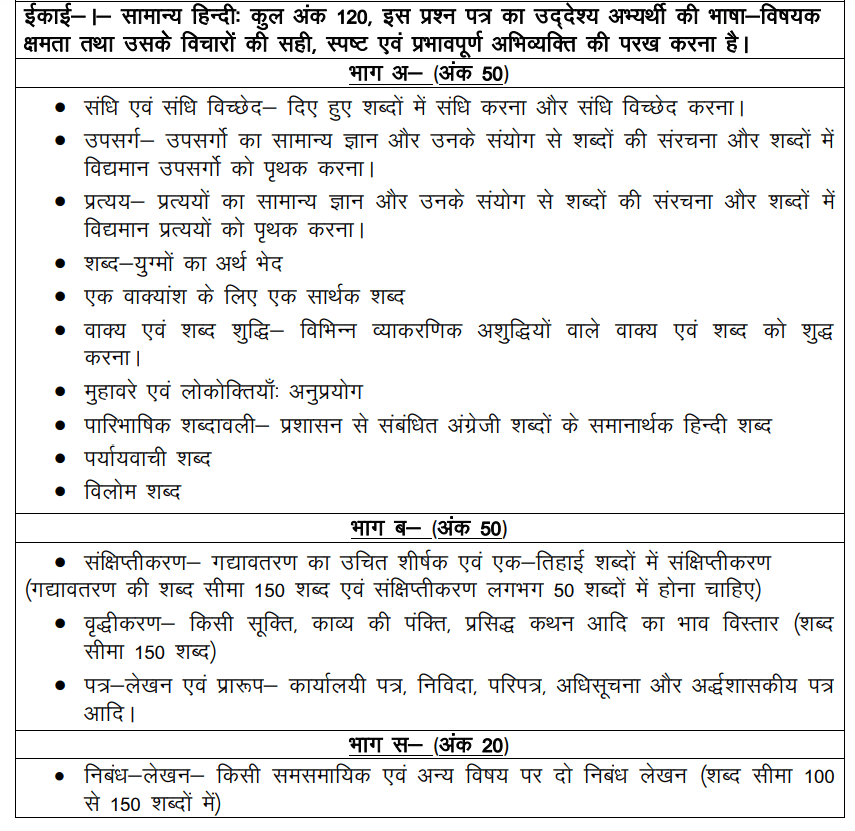
After the exams and syllabus are released, most students run towards tuition and coaching. But is coaching and tuition necessary? Well, the answer is no. Students who can’t afford the coaching have also cleared the exams.
RAS Syllabus PDF Download
You can access the official pdf of the RPSC RAS Syllabus Examination through the direct link below.
| Exam Part | Syllabus (English Medium) | Syllabus (Hindi Medium) |
|---|---|---|
| Prelims Syllabus | RAS-Prelims.pdf | RAS Prelims-Hi.pdf |
| RAS Mains Syllabus | RAS Mains PDF | RAS Mains-Hi.pdf |
Interview Round
A candidate must successfully clear RAS. Prelims as well as RAS. Mains to become eligible for Interview Round. This round is considered the most arduous part of the whole examination procedure.
The interviewers test the candidate’s personality and attitude. A suitable mock interview test before appearing for this final round may increase your chances of getting selected.
The RAS Examination is very competitive, so you should know the in-depth RAS syllabus. We recommend that you start your preparation right away and with the help of suitable study material. You can also buy relevant courses online to enhance your preparation strategy, or if you haven’t already, buy suitable courses from dhurina.net. Study material plays a vital role in the preparation, it enhances your speed, and you can also cover your topics thoroughly and precisely. For more information and the latest news, stay connected to our website.


